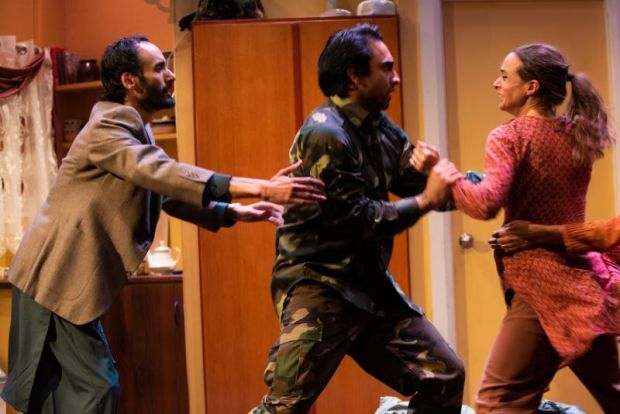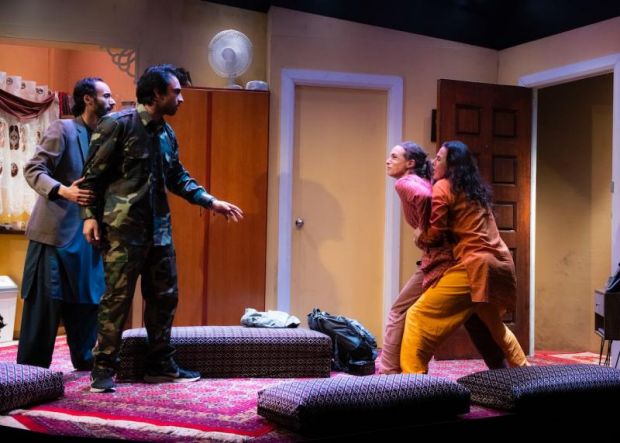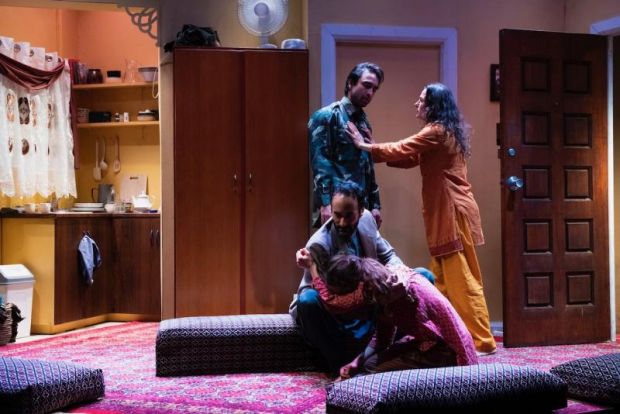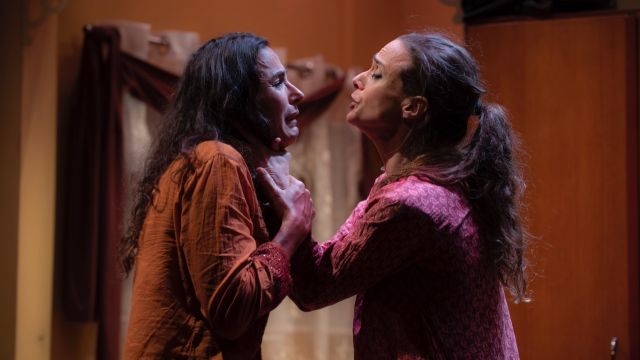Selling Kabul
Kabul 2013. The United States has begun its withdrawal and the Taliban is filling in the gaps. Taroon (Khisraw Jones-Shukoor), a hot-headed young fellow, was a translator for the US military, working with an American called Jeff. Taroon signed up for that to impress girlfriend Bibi. It worked: now she’s his wife and in hospital having their first baby. But Taroon is an assassination target for the insurgent Taliban – which puts his family in danger too. He’s been hiding out in his sister Afiya’s (Nicole Nabout) small apartment for four months, supposedly making absolutely no sign that he’s even there. American Jeff promised Taroon a visa. It hasn’t arrived.
Selling Kabul is a thriller. It plays out in Afiya’s apartment in real time. The ostensible antagonists are the Taliban and the United States who have abandoned those who helped them, but it’s those forces that are the clamp keeping the characters locked in place and in constant, unrelenting danger. The enemy is outside; the conflicts are between our characters: Taroon, Afiya, her husband Jawid (Farhad Zaiwala), and Afiya’s friend and neighbour Leyla (Claudia Greenstone).

At first glance, we might think it’s Taroon’s story, but he’s a purely reactive character by force of circumstance – and, despite those circumstances I think we get a little weary of Taroon’s one-note character.
Selling Kabul is Afiya’s story. It is she who must hold it all together: stay calm, chastise and restrain her unruly brother, visit Bibi in the hospital, reassure her guilty husband, and lie to him, and lie to her chatterbox friend Leyla. All while she has been trying to conceive a child of her own.
As Afiya, Nicole Nabout gives a wonderful, layered performance, adapting and suppressing herself for the needs of others and yet doing so with warmth, patience, humour and a strength that is close to exhaustion.

Playwright Silvia Khoury ratchets up the tension even further by releasing new pieces of information as the play proceeds. As in, ‘I didn’t want to – or I couldn’t - tell you this before, but…’ Outside, in the streets, in the hospital where Bibi this very day has her baby, things are actually worse – more dangerous, more crazy, more murderous – for everyone.
The rule about thrillers is that it is the situation, the jeopardy that defines the characters and leads us to identify and care about them. That’s the case here. With the exception of Nabout, who fleshes out Afiya and makes us love her, the others serve to add to the fraught situation so that things cohere and build to the play’s climax. Farhad Zaiwala’s Jawid has a quiet, dogged dignity and we do feel his bitter guilt at what he does to survive: making uniforms for the Taliban. It is Jawid who gives the play its title: he’s sold out. But then again, that puts food on the table and provides a haven for his wife’s brother, and maybe the new child.
Claudia Greenstone gets the functional character of Leyla just right – cheerful, likeable, but also an irritating stickybeak whose failure to read the room makes us hold our breath. Leyla also has some key exposition re horrific developments outside – but – rule of thumb – best to avoid key exposition through shouting or tears. Here, some key information that provides an accelerating turning point is almost lost in the high emotion noise.

The threatening world outside is created via Grace Ferguson’s sound design – vehicles, gunfire, voices, singing, distant explosions – but this element could be less subtle – and evoke more reactions than it does from the characters. Richard Vabre’s lighting too could do more work to enhance the claustrophobia. Yes, the play is in real time, but by the closing climactic moments, it’s night. Darkness falls. Hence a truck’s headlights on the curtains. But the lighting in the apartment stays the same (or seems to) throughout. Sophie Woodward’s set is yet another imaginative use of the small Red Stitch space: Afiya’s and Jawid’s apartment is ‘normal’ but cramped, a jail cell, especially for stir-crazy Taroon, alone and silent all day – and then frantically desperate to see his newborn.
As a thriller that also illuminates the lives of the people left behind – ‘betrayed’ might be a more accurate term – Selling Kabul is a beautifully structured play building inexorably to forced decisions (and more lies) but some vestiges of hope. If we are left at the end not quite as moved as we might be, that may be due to Khoury’s sheer efficiency in her structure and in the perhaps too tentative use of sound and light.
Michael Brindley
Photographer: Jodie Hutchinson.
Subscribe to our E-Newsletter, buy our latest print edition or find a Performing Arts book at Book Nook.

